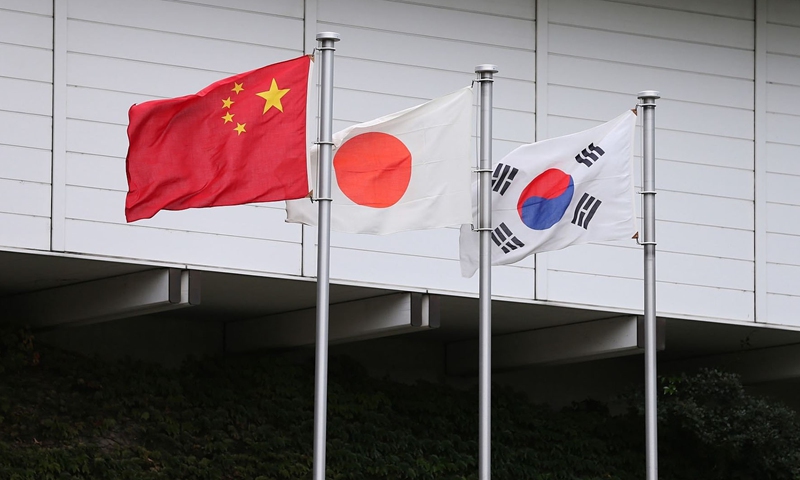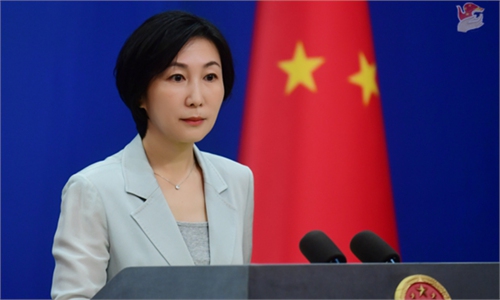S.Korea urged to respect China's core interests before top diplomats' meeting in Busan

China Japan South Korea File photo:CGTN
The top diplomats from China, Japan and South Korea are reportedly gathering this weekend in Busan, South Korea. Analysts noted that while high-level exchanges among the three neighbors are crucial to maintaining regional stability, the South Korean government needs to act prudently and stop pointing fingers at China's internal affairs to foster amicable momentum for the long-delayed meeting of the three nations.
South Korea said on Friday that its Foreign Minister Park Jin will meet with Chinese Foreign Minister Wang Yi and Japanese Foreign Minister Yoko Kamikawa on Sunday for broad discussions on ways to boost trilateral cooperation and other regional and global issues, Yonhap news agency reported.
Yonhap also detailed that on Sunday, Park will hold separate bilateral talks with Wang and Kamikawa, respectively, before inviting the two ministers to a luncheon meeting. The three-way talks will take place after the luncheon.
As of press time on Friday, there has been no information on the top diplomats' meeting from China. The last trilateral meeting of foreign ministers from China, Japan and South Korea was held in August 2019.
The topic of promoting trade and business and people-to-people exchanges will be brought by the top diplomats. Serious disputes will also be discussed, especially on Japan's dumping of the Fukushima nuclear-contaminated water and South Korean President Yoon Suk-yeol's recent remarks related to China's Taiwan and the South China Sea, analysts said.
COVID-19 is not the only reason for the suspension of the trilateral ministers' meeting. Over the past four years, the three countries' relations have undergone great changes. For example, Japan's dumping of Fukushima nuclear-contaminated water into the ocean has drawn discontent from China and South Korea, while the South Korean leader's remarks that meddle in China's domestic affairs on Taiwan has also crossed China's bottom line, Lü Chao, an expert on the Korean Peninsula at the Liaoning Academy of Social Sciences, told the Global Times.
As the current rotating chair, South Korea has been pushing to host the foreign ministers' meeting to promote more interactions. Lü noted that some South Korean media had reported that China and South Korea had coordinated on a meeting between the top leaders during the APEC summit in San Francisco, but no such meeting was made.
While visiting the UK this week, President Yoon kept talking about China, drawing criticism and concerns from some South Korean scholars. In November, while meeting with UK Prime Minister Rishi Sunak and signing The Downing Street Accord, they also talked about the Taiwan question and topics on the East and South China Sea.
In response, Chinese Foreign Ministry spokesperson Mao Ning said at a press conference on Friday that the Taiwan question is purely China's internal affair and brooks no interference by any external forces, and as for issues related to the South and East China Seas, neither South Korea nor the UK is a concerned party.
China urges the relevant parties to stop making irresponsible comments on issues that have a bearing on China's core and major concerns and to be very prudent about what they say or do, said Mao.
Lü noted that it is strange to see the South Korean government still insisting on pointing fingers at China's internal affairs and making provocations while Japan has made adjustments to its relations with China, as China and the US are working to stabilize their relations, especially before and after the top leaders' meetings in San Francisco.
Moreover, as the Yoon government has taken a one-sided policy to lean toward the US, it has not only made arbitrary accusations against China but also increased its military exercises with the US, worsening the situation in the Korean Peninsula, said Lü, noting that the current tense environment is not conducive to a trilateral summit of top leaders.
The expert noted that China, Japan and South Korea are the three locomotives of regional development and their cooperation is not only beneficial to peoples in the three countries but also to regional and global development. Making better use of the current cooperation mechanism and settling disputes is the shared hope of the three countries.
However, the South Korean government does need to reflect on its policy toward China. If South Korea and Japan cannot get a correct and clear understanding of not making provocations against China's core interests, it will be hard to promote concrete cooperation, said Lü.

